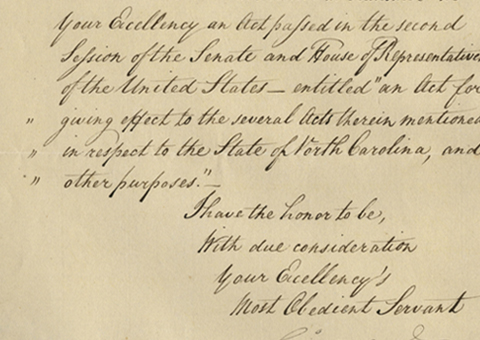Noah Webster Promotes the Sale of His Noted Books
He is rather sarcastic about the works of his competitors.
Noah Webster thought that Americans should be taught from American books, so he wrote a three volume compendium, A Grammatical Institute of the English Language. The work consisted of a speller, a grammar, and a reader. His goal was to provide a uniquely American approach to training children. Relying on his own...
Noah Webster thought that Americans should be taught from American books, so he wrote a three volume compendium, A Grammatical Institute of the English Language. The work consisted of a speller, a grammar, and a reader. His goal was to provide a uniquely American approach to training children. Relying on his own experiences as a teacher, Webster made the Speller elegantly simple and gave an orderly presentation of words and the rules of spelling and pronunciation. Slowly he Americanized spelling.
In December 1793, he turned his attention to journalism and founded New York’s first daily newspaper, The American Minerva. In 1806, he published his first dictionary, and the following year he began writing an expanded and comprehensive dictionary – his great opus, the American Dictionary of the English Language, which would take twenty-seven years to complete. Interested in religion, Webster released his own edition of The Bible in 1833, based on his own translations. Here he critiques the works of his competitors, expresses his concern for how the sales of his books are going, and arranges for an agent to receive a supply.
Autograph Letter Signed, New Haven, Conn., March 31, 1842, to Samuel Parker, a Congregational minister famed as a missionary to the Indians in the American west, who was married to Webster’s niece. An author himself, Parker was apparently assisting Webster in the sale of his books. “I have lately received from Mrs. Parker five dollars on account of my books sold, & ten I received last winter. It was not for money that I wrote to you for a statement of books sold, but to ascertain the condition of things. The bearer of this, I expect, will be the Rev. Smith Dayton of the Methodist connection who is very much my friend. He has been many years a teacher & is now engaged for a few days in spreading my books: The Bible, large & small; The Testament, large & small; the History, Manual & Grammar. I suppose he can do nothing for me in Tompkins County, but perhaps he may. You will give him your advice.
The Deputy Superintendant of Schools in Herkimer has recommended [Charles W.] Sanders’ Spelling Book & other books. I am surprised at this, if anything, in these times, could surprise me. The critical state of public affairs & the wretched state of money is all against me, & probably against you, but I see no present remedy. If Mr. Dayton shall want any of the books of mine in your possession, please to deliver them to him. We are in comfortable health & Mrs. W joins me in love to Mrs. Parker & her daughter.” On the verso, Webster, an advocate of American spellers and grammars, adds a rather sarcastic note about an American newspaper’s laudatory notice on the new speller put out by an Englishman, Lyman Cobb. “I see Cobb’s new spelling book is highly praised in the New York Sun. I have not yet seen it.We have a great many such books & all are the best.” A fascinating letter of Webster dealing with his famous books, including his speller and grammar, and the first letter of his that we have had.

Frame, Display, Preserve
Each frame is custom constructed, using only proper museum archival materials. This includes:The finest frames, tailored to match the document you have chosen. These can period style, antiqued, gilded, wood, etc. Fabric mats, including silk and satin, as well as museum mat board with hand painted bevels. Attachment of the document to the matting to ensure its protection. This "hinging" is done according to archival standards. Protective "glass," or Tru Vue Optium Acrylic glazing, which is shatter resistant, 99% UV protective, and anti-reflective. You benefit from our decades of experience in designing and creating beautiful, compelling, and protective framed historical documents.
Learn more about our Framing Services







































































































